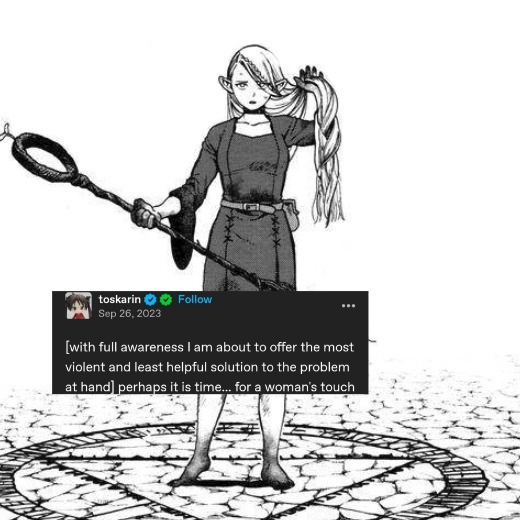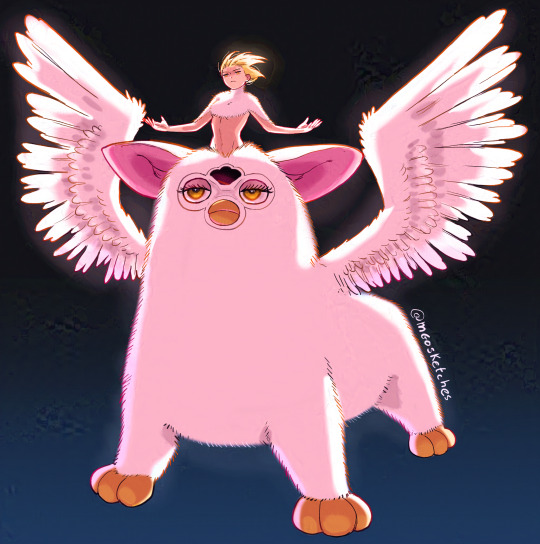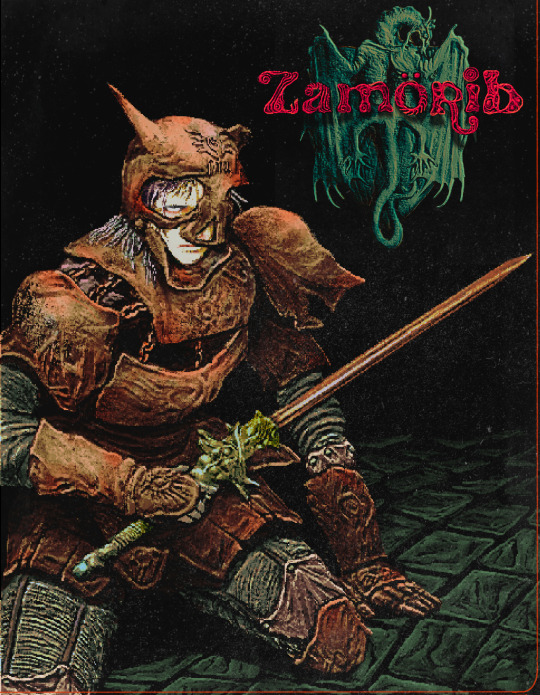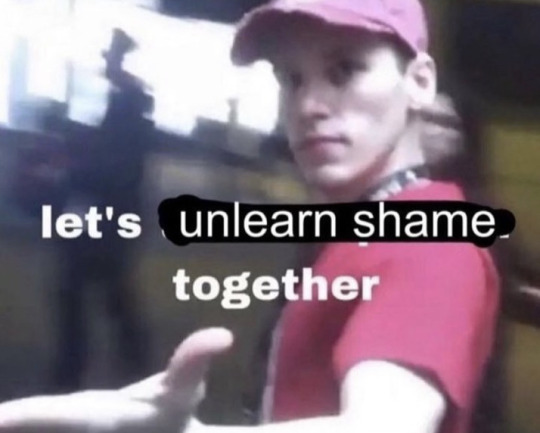Melvin/Cheesy. 20, officially the cheeseman. Trans man. he/him. DNI N/F/Ts CW: The sopranos, BB CR: JJK, WHA
Don't wanna be here? Send us removal request.
Text
Autism in JJK Part 1 (Isolation and Movies)
Notes before we start.
1) Read the light novels. They are the equivalent of Bleach's CFYOW for JJK. There is a fan translation (Book 1 & Book 2), but I will be citing the official translation from my own copies.
2) I will be mainly using the TCB scans for the manga because of their accessibility.
3) Read the light novels.
(Click images for captions/citations.)
Preface
Dungeon Meshi is heralded as The ultimate story of incompatible autisms. Everyone recognizes Laois and most of his party as autistic. Each of these characters are able to use their specific types of autism to solve problems throughout the series.
Laois’s autistic traits in particular have drawbacks when it comes to others’ perception of him. To directly quote one of the best Dungeon Meshi text posts on this site:
“Dungeon Meshi is about a quirked up white boy on a quest to save his sister and perhaps indulge his special interest along the way. He's a man of pure heart who has done nothing but help anyone he's met. Then part way through the story you start seeing other pov characters and it turns out every single person who has met him outside his party has read his awkward social skills and love for grilling as a sign of something deeply evil and has vowed to kill him on sight.”
Using Laois as a reference, I want to argue that Jujutsu Kaisen is the penultimate story of incompatible autisms.
Addendum/Disclaimer
I’m heavily drawing from experiences with my particular brand of autism for this analysis, so I’m bound to not properly consider everything. My words should not be taken as gospel since autism is a wide spectrum that manifests differently for each individual. Certain autistic traits will show up for one person and be completely absent in another. (And I personally think JJK does a great job of showcasing this variation.)
There is also significant overlap between Autism and ADHD which I’m not qualified to make connections with. (Basically if you have ADHD feel free to explain how you see yourself in these characters too.) There’s probably other readings that have flown over my head, but please understand I’m not trying to be malicious.
The main traits I’ll be referencing are:
Social Unawareness
Bluntness (and it being perceived as rudeness)
Taking Things Literally
Double Empathy Problem (the non-autistic and the autistic have a hard time understanding each other’s way of thinking and therefore struggle to communicate with each other)
Emotional Blindness/Alexithymia (difficulties with understanding and articulating one's emotions)
Hyperfixations
Special Interests
(Stimming is left out because of Tumblr's 30 image limit. Someone else can make that post for me.)
Mahito’s Autism
Strange title section right? Allow me to defend it. Mahtio’s Domain Expansion (DE) Self-Embodiment of Perfection is localized from 自閉円頓裹 (Jihei Endonka). The first two kanji 自閉 (Jihei) create the Japanese word for Autistic. Where 自 (Ji) is self and 閉 (Hei) is close/shut. The Japanese word for Autism is 自閉症 (Jiheisho) where 症 (sho) means disease. A very literal translation of Jiheisho is “self-shut disease”.
Equating autism to an illness that causes one to shut themselves inwards is flawed in its framework, but not wrong in describing the unique isolation autistic people face. If the kanji used didn’t clue you in, Japanese society is much more hostile to the autistic than English speaking countries. This is in part due to many autistic traits being seen as socially unacceptable for deviating too much from the norm.
There’s been a whole study on this if you want to know more. (This study allowed for self-diagnosed people to participate and included non-binary gender options, so I’m comfortable using it.) Quoted directly from the source:
“Many autistic individuals engage in social camouflage and attempt to use social interaction to obtain job opportunities and other benefits. The aforementioned ‘need’ of autistic individuals to engage in social camouflage forces them to continuously pretend that they are non-autistic. This is associated with significant manifestations of mental health deterioration, such as depression, generalised anxiety, social anxiety, suicide attempts, and burnout because of exhaustion and fatigue.”
“Markus and Kitayama refer to Japanese and other East Asian cultures as ‘cultures of interdependence’. In these cultures, the primary challenge faced by individuals is to conform without standing out and pay more attention to others than oneself. Thus, the ‘uniqueness’ of autistic people can be perceived negatively, and it can threaten relationships and interpersonal harmony within the community.”
Now what does discrimination against autistic people have to do with Mahito? Well, everything. Mahito manifested as the hatred between humans, making them unique within the Natural Disaster Curses group. This causes friction in their relationships with the other curses, mainly Jogo.
When Dagon dies, Jogo mourns. When Hanami dies, Jogo and Dagon mourn. When Mahito learns about this? They react like this.

Totally not appropriate for the situation. You could chalk it up to them being a curse, but the other curses have already shown they’re capable of caring deeply for each other.
This isn’t the only instance of it either. In the light novels, Mahito really gets into movies to better understand humans which results in this.

Jogo simply does not know what to do with Mahito becoming a filmbro.
Jokes aside, Mahito is using movies and other forms of media to better understand people not like themself. And despite their efforts to better grasp emotions, this causes Mahito to become even more alienated from his peers. He’s in his own little bubble and his way of thinking is boon when fighting but a bane for his relationships. There’s something very autistic about that.
Shared Special Interests
On the flipside, Mahito’s movie and book fascination causes them to create a bond with a blind homeless old man that lives under a bridge. But it’s only because the two of them have this interest in common.
As stated in CFYOW, JJK Summer of Ashes, Autumn of Dust Chapter 3: Allegory in Darkness, Mahito has canonically read Kafka.

And that line at the end. “It makes talking to you easy.” This is the same phrase Mahito uses when grooming Junpei. Though Mahito’s relationship with Junpei is one of manipulation, it started as something rather innocent—they both went to the theater, saw the same movie, and were annoyed by the people disrupting their viewing experience.
That small connection, their shared interest in movies caused them to bond quickly and Mahito used it for manipulation. (This is not unlike how minors in fandom spaces can be groomed by the adults around them.)

Mahito learned how to be this way in part by studying media and applying it to their actions. They can’t interact with most humans 1-on-1, so their main source of understanding them is media, which gives them this warped sense of reality. Think Plato’s Allegory of the Cave. Mahito doesn’t know better because this is all they know.
It’s no wonder they conclude that humans at the core are creatures that eat, sleep, and rape (Ch 49 Pg 18 Sorry I ran out of image space). Think of how many “the joke is sexual assault” type characters there are in Japanese media alone. (Let’s not ignore how bad it gets in American 80s comedies too.)
Mahito is essentially a blank slate with no frame of reference for morals, critical analysis, or media literacy in general. It’s not very surprising they take everything at face value and then use it for evil.
And that’s why I wanted to discuss them first. Mahito is a reflection of humans and their reaction to media has echoes in how other characters, who are probably autistic, navigate their relationships with themselves and other humans.
Itadori Yuji’s Autism
When I say Yuji is pure and the goodest boy in the world, I’m referring to the unbridled autistic joy in which he interacts with the world. He’s not much different than Laois from Dungeon Meshi. The way Yuji introduces himself to others is unhinged. He frequently does and says things that are not socially appropriate in the slightest. Whatever comes to mind first he acts on, no filter.

But being unhinged isn’t necessarily autistic. What gives this the ‘tism is the socially inept internal logic that goes into Yuji’s decision making. Dudebros may refer to it as locking in, but it is better known as hyperfocusing. You give Yuji a task and he Will complete it, anything in his way be damned.
Ijichi gave Yuji a task. Figure out if this person is an enemy and make sure nobody gets hurt. Interrupting a convo and pantsing a guy to complete this task is Yuji autistically logicing his way around setbacks. What’s a non-violent way to get someone to leave? Stealing their pants, probably. Things like social rules don’t matter if lives are at risk.
Don’t believe that’s socially-blind autistic logic? Let me give you this guy from 4Chan and myself as an example. As a child I was told I should never lie no matter what. At 8 years old, I did something that upset my teacher. I didn’t know I had upset my teacher until I was asked to write an apology letter by my parents. So in my little pea brain, I had no reason to apologize because that would be lying. I then wrote something along the lines of, “I’m only writing this apology because my parents are making me.” (I got yelled at for this which confused me even more. What do you mean you want me to lie, mother???)
You can see this kind of logic with the finger eating especially. Yuji took Megumi’s words very literally and ate a mummified human finger because that’s what was needed to save lives. This isn’t a one off thing either, it keeps happening over and over—Yuji taking the most literal interpretation of the words spoken to him and acting on them in the most autistic way possible.

I love the Nanamin alert especially because only Idatori Yuji would think to do that. It also a neat showcase of the double-edged sword that can come from autism. Yes, Yuji effectively and quickly relays important information to his allies, but to their enemies as well. He also does it in a way that gets him bopped on the head by Megumi. Kind of like how going along with Gojo’s plans has him bullied by his classmates.
This happens a lot too—Yuji doing what others tell him to do, filling in the blanks when they fail to elaborate on the how to, and it backfiring.
There is nothing more autistic than doing exactly as you are told and getting punished for it.

Nanami tells Yuji not to call him Nanami-sensei. But he doesn’t tell Yuji what exactly to call him instead, so he guesses. And since Yuji is socially unaware to a degree, he comes up with Nanamin instead of the Nanami-san that would’ve been more polite.
Megumi and Panda tell Yuji to lie. But lying isn’t in his nature so he really sucks at it. Pretending he doesn’t know who Gojo is because 1) he was told to lie and 2) Gojo is a part of the group Yuji is was explicitly told not show any familiarity with, is peak autism logic.
It’s all a part of Yuji’s charm though. Despite his autistic traits getting him into plenty of trouble, they also are a big reason as to why everyone loves him.
Yuji’s Autistic Rizz
Yuji seems to mirror other people both to better understand them and because he’s relying on them to show him how he’s supposed to act. (More on that here.) Most of the time this is played for comedic effect, but sometimes it results in instant pair-bonding. I think that’s the autism-to-autism connection being made. (It’s also known as the morphogenetic field if you’ve played 999.)
Just like how Mahito used movies to bond with Junpei, Yuji does it too. But he uses this shared interest for good and provides a counter to Mahito’s grooming.

And lookie here, he can even utilize his love of movies to bond with people who aren’t into them at all. Junpei’s mom may not get it, but she’s endeared by it. This unparalleled autistic rizz is fundamental to Yuji’s character. And in my opinion, his relationship with Todo Aoi best showcases this.
Everyone knows that Todo and Yuji’s shared love of tall women with big butts is what brought them together. But what’s most overlooked is the specific tall woman with a big butt that made this possible in the first place. Before Todo even asks Yuji for his type, Yuji makes it known he is aware of who Takada is. (He happened to see her on TV as stated in CFYOW, JJK Summer of Ashes, Autumn of Dust Ch 4 Pgs 89–90. Ijichi is the secret Takada fan.)

Takada is who prompts Todo into asking. She is also the one who appears in Todo’s delusions, guiding him to victory and driving most of the reasons behind his actions. With great confidence I can say Todo’s special interest is Takada. (And most of the fanbase assumes he’s autistic, so I don’t feel the need to explain that more.)
And what’s crazy about his special interest of his is that it fudging works. Takada and his love for manga help Todo create successful strategies. I include his love of manga because his fakeout with Mahito is a Hunter x Hunter reference.

It’s a bit spoilers to discuss how exactly this is genius, but you’ll have to trust me when I say it’s very clever. Rather than simply nodding to the source material, Todo is using the twist reveal from that scene and subverting it to help Yuji win.
This is nearly identical to Laois utilizing his special interest monster knowledge to create victories out of what would be defeats for other characters. Todo weaponizes his autism in a way that works perfect for sorcery.
But when it comes to interpersonal relationships? It destroys them. Everyone who isn’t Yuji hates Todo.

Todo Aoi is second to Gojo Satoru when it comes to characters considering him the greatest source of stress. (Momo, Mai, and Kamo with Kokichi dedicating pages 43–46 of CFYOW JJK Thorny Road at Dawn, Chapter 2 to how much Todo stresses him out.)
They’re most annoyed with him when he talks about his special interest—Takada. She is a huge reason as to why Todo is such a good sorcerer, you could even call her The Reason he’s so good. People rely on him quite literally weaponizing his autism. But when he starts being autistic outside of sorcery? They don’t tolerate it.
This is a recurring problem for autistic sorcerers. The very people that depend on their weaponized autism will scorn it the moment it no longer serves them directly. It’s a very Not In My Backyard (NIMBY) mentality. Sure they want all the benefits but keep the drawbacks out of their sight.
Yuji’s Loneliness
Just like Todo, Yuji suffers from social disconnect due to his autism. He feels like he struggles to understand and connect with others on a deeper level. His own feelings and other people’s feelings are sometimes a mystery to him.
On a surface level Yuji seems to be on the same wavelength as Junpei through their shared love of movies. That is until they fight each other. Yuji doesn’t understand that Junpei is acting out of grief at the start of their fight. He says something insensitive at first, but he eventually asks Junpei to spell things out so he can understand what’s going on.

It takes until the end of the Sukuna fight for Yuji to truly connect with someone—Megumi. But it’s only because they both make their feelings known directly to each other. Before that though? As discussed earlier, the autistic traits that make him good at sorcery are often off-putting to others.
I mentioned how Yuji mirrors others in what seems to be an attempt to understand others in that post I linked. In the same one I also discuss how Yuji is able to decenter himself and sync up with just about anyone. With respect to his autism, this really reads like masking to me.
When Yuji lets that mask slip and indulges his personal hobbies, it’s a toss up on whether or not he’ll be accepted or rejected. The movies that allowed him to pairbond with Junpei don’t work for everyone. Just like Mahito with Jogo…being a filmbro causes friction with Megumi and Nobara.
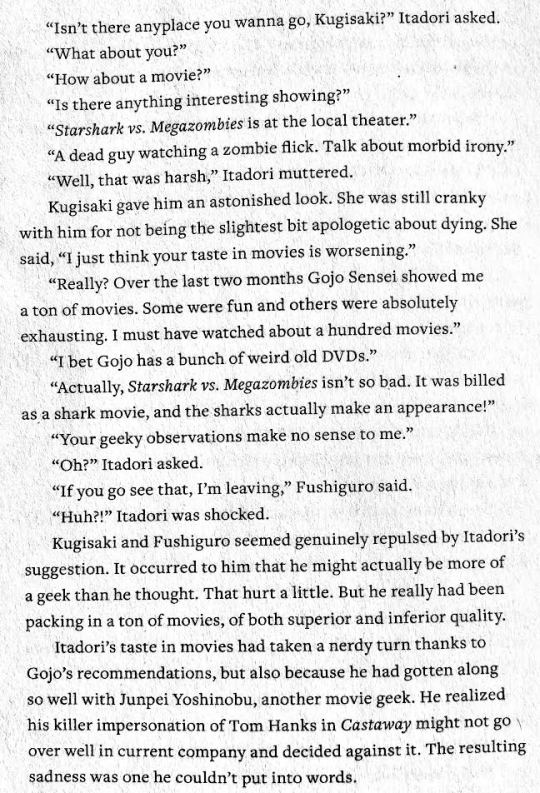
Though Yuji otherwise gets along very well with Megumi and Nobara, there is something so very relatable and sad about seeing this particular hobby of his being trashed. What’s worse is that the 2 people who would’ve matched his freak in this regard are both dead: Junpei and the one who intensified this interest of his in the first place—Gojo Satoru.
Gojo Satoru’s Autism
I must confess, this entire post got written because of this anonymous ask I was sent a while ago. I was surprised to get it since I assumed everyone understood Gojo to be autistic by default like Laois Dungeon Meshi. So I’m going to copy and paste this anon’s words because all their observations are correct.
"As someone with Autisim, I heavily identify with how he was raised (the gifted child who is too observant vs the prophesied child who was raised to be a weapon first) and the way other react around him (treating everything he says and does with disdain)
I find the way he clings so strongly to the idea of strong and weak even after Geto and Toji yet still having a sense of justice/ noticing the unfairness of it all, his sensitivity issues, his ability to notice emotional cues yet not having the means to respond in an allistic way, his tendency to take his jokes and teasing too far/ act too close to people, and the general othering of him just screams autism to me. Like can see a lot of those traits which is usually tamped down by society being exasperated because, what are you going to do, he is the strongest, you can't just tell him off in a serious way, not when, in your society, the strong rule.
I see it especially with his students, where he's taken in all the misfits and is so casual with them in day to day life. Even him throwing them in the proverbial deepend with missions is probably how he was taught by his clan before entering jujitsu tech."
And directly from Gege via the special Gojo Booklet.
"Q25: born and raised as a high-born, he is regaled by both himself and others are the strongest, and he seems to have want of very little, but what would you consider Gojo's weakness?
A25: His personality.
Q26: what would you consider Gojo Satoru's most intrinsic strength, when you put aside his innate abilities, influence, and physical prowess?
A26: His personality."
Thank you Gege for stating it so bluntly. The part of Gojo’s personality that is both strength and weakness. Something that makes him a great sorcerer and socially isolated. That’s the autism.
Now that we (that anon) has established that Gojo Satoru is definitely autistic, let’s go over how this has affected his interpersonal relationships.
Improper Socialization
The Gojo Booklet has forever ruined me. Deep in my heart, I knew this was going on, but to have everything confirmed so bluntly is something else. To summarize:
Gojo was born and raised in Kyoto by an extremely closed-off traditionalist family. His Clan treated him as an investment rather than a person, focusing on his education as a sorcerer and neglecting him emotionally to create the perfect living weapon. It’s implied he was educated privately and did not attend a school with other people until high school. It’s also implied that the Clan kept Gojo under strict watch while his powers developed because of the assassination attempts. Regardless, the isolation, training, and exploitation he endured was severe enough for him to break out and run away multiple times. His attendance at Jujustu Tech in Tokyo was his first time being allowed to interact with others on his own terms rather than his Clan’s.
This means that until Gojo was 15, he likely never had friends. His interactions with other humans amounted to deification, a type of objectification where he was expected to be a tool to further other people’s comfort. Essentially, up until he met Geto, he only knew how to exist as a living weapon.
I don’t think I need to explain why this would negatively impact socialization. Anyone raised by extremely strict/abusive parents or a cult will tell you how difficult it is to try and interact with normal society after having social skills deliberately stunted for most of your life. This lack of socialization is only compounded by autism. Not only is a sheltered autistic person inclined to be socially unaware, they have no frame of reference to what is socially acceptable.
I’ll use myself as an example. The only reason I’m not completely unpalatable in conversation is because public school allowed me to observe what normal human interactions and mannerisms look like. Otherwise, I’d be like Mahito—learning about the world through the limited media I was allowed to consume. (And even then I still took it at face-value for a pretty long time.)
Gojo is sort of in the same situation as Mahito. His Clan reportedly spoiled him rotten, so he was probably allowed to have all the toys, TV, movies, books, and games he wanted between obligations. This means that it is very likely his ideas of the world at large come from media. And boy does it seem to have affected the way he is.
Trying to Connect with Others
Nanami directly compares Gojo to Mahito. Megumi straight up thinks Gojo and Yuji are the same kind of person as stated in CFYOW, JJK Summer of Ashes, Autumn of Dust Chapter 1: Kiyujitsu Kaisen.

So like Yuji and Mahito, Gojo will use media he’s familiar with to make sense of the world around him and hold conversations with others. (In the anime they have Gojo do the tornado kick which straight up appears to be him doing an in-verse reference to Code Geass's Suzaku Spin Kick aka the Spinzaku Kick. Please do not ask me how I recognized this.)

And would you look at that. Most people do Not know how to handle this. Not even Geto who is more visibly confused by his Digimon metaphor in the anime.
I can’t really blame them for their reactions either. Gojo is such a special combination of unfortunate circumstances and experiences that you might as well be listening to someone speak an unknown language.
This goes both ways too. Gojo himself has a very hard time understanding others and tends to take the words of others Very Literally. (Just like Yuji!) This leads to him experiencing the Double Empathy Gap the most when compared to other autistic characters.

The Geto stuff is the most tragic to me. Gojo checked in on him and Geto lied about his feelings. To Gojo, Geto is his best friend. Why would he lie to him? Geto says he’s ok so Gojo thinks he’s ok. (That’s not even getting into the higher ups overworking them both and keeping them separate on purpose.) His upbringing and his autism made it impossible for him to read between the lines, so Geto's betrayal very much comes out of nowhere for him.
The same happens with Shoko okaying the desecration of his corpse, Nanami calling him a pervert and everyone agreeing. Gojo truly believes that the people close to him see him in a very one-dimensional way and there’s nothing he can do about it. After all, he was raised to be a weapon and nothing more.
Funnily enough, Gojo’s Alexithymia is so bad that parts of the fandom have seemingly done the double empathy gap thing to him with respect to his flower metaphor.

“There was always a gulf between me and other people, even if they adored me. You can admire a flower and help it bloom…but you can’t ask it to understand you.”
To me, all Gojo is doing here is explaining his feelings as best he can. Floral language is a big thing in Buddhism which is probably why he makes the comparison. However…I’ve seen interpretations of this that conclude Gojo believes himself so far above others that they might as well be non-sentient plants. To them, this metaphor speaks to his arrogance rather than a clumsy/poetic attempt to communicate his feelings.
I’ll use myself as an example to explain why I think it’s just the autism in action. I often like animals way more than I do other people. Snakes, birds, lizards, spiders, and scorpions are amongst my favorites. Sometimes I compare people to these animals.
What I mean: I think highly of you! You share traits with my favorite animals and that makes me happy.
What others can hear: I think you’re stupid (lizard/bird brained), untrustworthy (a snake), and lesser than me (a bug/arachnid).
Now I could be projecting because I see my autistic traits in Gojo, but I do find it fascinating that how you view Gojo’s flower metaphor is highly dependent on how you feel about him.
Regardless, it does a great job at illustrating how isolated Gojo feels from others. Sometimes my autism makes me feel like I’m a completely different species because I can’t interact with people normally. And in Gojo's case, he can't even refer to himself as a human. The disconnect from others and his dehumanization is so strong he feels he can no longer identify as human.
No one’s autism is exactly the same, so this rift can even exist between autistic people. This is how you can get Yuji and Gojo bonding over their shared autistic traits but not fully understanding each other and feeling isolated for it.
But it’s still really sweet that they connect with movies so well that Gojo’s filmbroness rubs off on Yuji.

It’s also a little concerning that Gojo refers to these movies like a catalog for emotions. Like the proper way to experience emotions is through media and not in person.
The training Gojo subjects Yuji to with movies is likely how he was trained as a child. This suggests that for the first 15 years of his life, movies and other media might have been his only frame of reference for everything not Jujutsu Sorcery. And I mean Everything.
Combine this with The ‘Tism and this could possibly explain exactly what is wrong with Gojo Satoru. (You already know where I’m going with this.)
Gojo’s Racism
Here’s a list of movies for sure Gojo has watched. And for no reason in particular I’m going to include if they have a black person (like myself) in them.
Sourced from a Gege Interview.
Léon: The Professional (1994): Yes
The Descent (2005): No
The Host (2013): No
The Emperor's Naked Army Marches On (1987): No
Deep Blue Sea (1999): Yes
Extra movies from the anime. (Aka probably canon.)
Juggernaut (1974): No
Lord of the Rings: The Fellowship of the Ring (2001): No
That's only 2 movies with black people in them. I went ahead and watched them to confirm my suspicions...
Léon: The Professional (1994)
Not much to say about the black characters here. From what I saw and the IMDb list, they're all men and they're all background characters. Also I couldn’t finish the film because of how creepy it is towards the 11 year old actress. (It's really bad. Like really, really bad. Traumatized the actress, Natalie Portman, kind of bad. Wish I had a content warning!)
Deep Blue Sea (1999)
Gojo wasn't lying, the heroine died spectacularly. However in terms of spoilers, he glossed over the actual twist death. There's also someone who dies by being bit in half by a shark. And the way those legs looked like Gojo's...
There are 2 black characters in this movie. One is a jovial goofball chef who somehow survives to the end. (Miguel calls this trope out specifically in JJK 255.) There are so many points in this movie where he should've died. His name is Preacher and he has a parrot that is a Red-Crowned Amazon by the way. The other is a rich investor played by Samuel L Jackson who does Not fall into the Scary Black Man trope for once. Preacher doesn't either, he's more of a Gentle Giant.
Both of them function in the film as a subversion of the Magical Negro trope. And after watching this movie, I think Gege was inspired to make Miguel Odol fill this role too.
Anyways, the takeaways from this are 1) Black people are underrepresented in media. 2) What is representing black people in popular media isn't all that varied.
This means if media is your only exposure to black people, those representations will be internalized if you're uncritical about it. (You're reading this on Tumblr I assume you believe racism is real.) It's unconscious most of the time. People usually don't actively go, "Wow black people are all like this!" What happens is they run into a black person irl, are reminded of their impressions via visual similarity, and then say or do some out of pocket nonsense. (I have personally experienced this at the hands of Japanese tourists.)
And what does Mr. Gojo Satoru say to Miguel first? He says Miguel looks like he’ll be trouble. Later he says Miguel's strength and build are because of his race and what makes him dangerous even though Gojo knows several Japanese men with similar physiques.
If he's never met a black man irl before...he must have gotten that idea from somewhere else. He does mention knowing the MMA star turned comedian Bobby Ologun (a big strong and goofy guy) when comparing him to Miguel.

Bobby Ologun is Nigerian. Miguel is Kenyan. Do you know how pissed East Africans get when lumped into the same category as West Africans and vice versa? (For the less informed please see Western Europe’s hatred of Slavs and other Eastern Europeans.)
But as far as Gojo knows from his media, black men are big, strong, and funny. The media he consumes also doesn’t bother to distinguish the different cultures of Africans. Dark Skin=Black and that’s it. And his dismissal of Miguel's distress over the loss of his rope only highlights that apathy towards individual cultures.
All this has terrible consequences for Miguel in the form of Benevolent Racism. This is where a prejudice that can be perceived as positive has negative outcomes for the target. Aka Gojo commits a racially motivated beatdown because of his ignorance that was fueled by the media he consumed growing up. (Miguel's Cursed Technique reminding Gojo of Toji not withstanding.)
Now I’m not saying autism makes you racist. It’s that Gojo’s isolation from the outside world, being raised by emotionally distant conservatives, and consuming media uncritically with his unique brand of autism creates the disaster that are the words coming out of his mouth.
Gojo being this kind of racist. Where he idolizes a type of strength in black people he learned from stereotypes in his movies, is great actually. I really like that Miguel calls it out and is sick of it. He even sarcastically tries to throw back the stereotypes about Japanese people to make his point too.
And guess who else only knows of black people through movies? Sukuna. He’s an art freak, there’s no way he didn’t watch some of those films Yuji was watching. And Miguel can smell it a mile away. Sukuna gives him that look and Miguel is already done with it. Honestly the way Miguel enforces his boundaries is great. He knows his limits both with risking his life and tolerating racism.

Anyways, Gojo Satoru has been running on 3 hours of sleep, sugar, and Reverse Cursed Energy like a madman for years. I don’t think he’s ever sat down and gone, “Huh? Why do I think the way I do? Why do I believe this?” Miguel is probably the first person to ever tell him, that’s racist my dude. (This is an explanation not an excuse btw.)
And that’s kind of the problem. Gojo is willing to learn and do better, but he hasn’t had the time do it on his own. Some outside force has to tell him bluntly, “Yo this isn’t socially acceptable.” (Think of how Geto influenced his morals and manners by telling Gojo exactly what he should do.)
This leads me to believe his mind is a hodgepodge of things he’s uncritically absorbed as a child and that has influenced his questionable beliefs/actions as an adult in ways he’s unable to recognize.
Gojo’s Other Problems
Outside of racism, Gojo’s most unpleasant traits include mild sexism and child endangerment. The sexism comes from how he speaks to Utahime and how treats Shoko compared to Geto. Though he otherwise does not outwardly discriminate against them, it is sus that he sees Rika, a girl transformed into a cursed spirit, and goes "Dang, women are scary." (The child endangerment is self-evident.)

For some reason, Gojo truly believes for some reason that the woman (Shoko) in his life isn’t emotionally capable of being on the same level with him as a man (Geto). This could just be a strength-based thing since Geto told him that’s why they can’t be together anymore. It’s really hard to tell. But if it really is a sexism thing, media in general being misogynistic could explain it. (On top of being raised by a traditionalist family in a society that is very sexist.)
Well-rounded female characters whose complex emotions and inner lives are explored in depth can be very hard to come by, especially in popular media. (If you want media that primarily focuses on female characters GO READ UMINEKO NOW.) A lot of the movies and manga Gojo consumes treat women as love interests first and people second. And since you’re reading this on Tumblr, you’ve probably seen posts that complain about this and how this feeds into irl interactions.
This idea comes into play with Utahime in a different way. Gojo doesn’t understand that Utahime actually hates him. This is a bit odd given that he usually takes people’s hostility towards him to heart. But a place where he could get the idea that her anger is secretly affection is…the tsundere archetype in the mangas he’s so fond of. (Gojo reads a lot of Shonen Jump, it’s no wonder he has negative rizz with women after they get past his good looks.)
Yuji does it, Todo does it, Mahito does it—they use the media they’ve consumed as a baseline for sorcery. They’re the best at what they do for it. There’s no way Gojo isn’t doing the exact same thing, especially when he’s teaching his students. He tries to fit the quirky mentor archetype who uses tough love to guide his students. (His blindfold might be an actual in-verse Kakashi Naruto reference.) And he falls into faulty logic where everything will work out if he leaves it all to his students which fulfills most Shonen story beats.

The stunt with Megumi that kickstarted this series is a 2-for-1 special. Gojo eating sweets is needed to maintain his technique. Him eating them is acting as a responsible adult. However, getting them several hundred kilometers away from his student who is in a dangerous situation is irresponsible. It may speak to how much he trusts Megumi to handle things on his own, but as an adult in charge of a child? This is very poor judgement on Gojo's end.
I also understand that Gojo's upbringing and Japan's culture (aka it's generally safe for a child to be outside alone) is probably why he's so comfortable leaving a roughed up looking child by herself. But like...he should've called someone for Hana. Maybe he did later? (Another case of is this Gege underdeveloping Hana/Tsumiki or is Gojo truly that careless towards little girls...)
Shonen is pretty notorious for uncritically putting children in situations. It probably doesn’t help that Gojo’s own family was violating multiple Japanese labor laws when putting him to work as a kid. I’m not joking about that either.
Per The Constitution of Japan (May 3, 1947) Chapter III Article 27 Paragraph 3:
“Children shall not be exploited.”
What constitutes child labor exploitation are outlined in Japan’s Labor Standards Act (LSA) or Act No. 49 of April 7, 1947.
Per LSA Chapter IV Article 56 Paragraph 2:
“…an employer may employ a child of at least 13 years of age in an occupation…which involves light labor that is not injurious to the child's health and welfare…”
Additional protections for workers are outlined in Japan’s equivalent of OSHA, aka the Industrial Safety and Health Act (ISHA) or Act No. 57 of June 8, 1972.
Per ISHA Chapter VII-2 Article 71-2:
“An employer must endeavor to create a comfortable work environment in order to improve the level of safety and health in the workplace by continuously and systematically taking measures as follows:
measures to manage the maintenance of a comfortable work environment;
measures to improve work methods for work in which workers engage;
providing and streamlining facilities and equipment for workers to recover from fatigue suffered in the course of their work;
the necessary measures to create a comfortable work environment, beyond as set forth in the preceding three items.”
I think it’s safe to say that Gojo not including any of his Clan members in his afterlife scene and being so overworked that he doesn't have hobbies or think much outside of sorcery is proof of this exploitation. Gojo’s self-reported best years of his life were high school and those were still exploitative as hell. The man is a walking and talking human rights violation.
The only time we see child Gojo is from the perspective of assassins staking him out. Gojo himself never willingly recalls his childhood, only his teenage years. He looks so serious and miserable compared to his older self too. (It kind of reminds me of how I was a very quiet, obedient child that blossomed into the yappy evil creature I am now thanks to obtaining legal rights and freedom as an adult.)
This exploitation of children at the hands of adults in Jujutsu Society is normalized in and outside of fiction in their universe. Gojo can tell something is wrong with how he was treated and doesn’t want his students to hurt for it. But he can’t recognize that child labor in or itself is bad, so his solution is to make them strong enough to stand up for themselves. (Aka trying to make a labor union without knowing what a union is. Still breaking child labor laws though.)
Might makes right is a Shonen staple (please see Dragon Ball Z or Baki the Grappler). And though taking that idea to heart seems to be the most of Gojo’s problems as a teacher, there’s an additional issue this genre has—neglecting emotional development and care for the most part.
Characters in Shonen or action movies will go through extremely traumatic events and have little to no reaction to them. (PTSD who? Unless you're goated like Steven Universe Future or Vinland Saga.) It can give people a false sense of invincibility. They also rarely ever discuss the steps that can be taken to handle these emotions. You’ll see characters have panic attacks but rarely how to coax someone out of it. Heartbreak is rampant, but the solutions are to never let go and let it consume you, never how to move on or mourn. (If outright ignoring it like nothing happened isn’t what occurs.)
You can see these kinds of ideas with Geto. A second love is not possible for Gojo. He was his one and only and will always be his one and only. That’s the type of romanticism that has always been in his media.
If Gojo has relied on media to teach him how to feel out his emotions, effectively and healthily coping with grief and breakups is pretty hard to find. Most of the time when media handles those topics directly, it does so in a way that promotes reflecting on your own experiences instead of instructing you how to deal with it. Something Gojo didn’t really have time for.
In the light novels Gojo greatly laments his own inability to deal with grief. He wants his students to learn how to do that effectively and even employs outside help with this.

The result of all this is a really overworked weird guy that feels like there’s no way to process his emotions. He puts on a mask when he talks to others and still winds up alienating himself. He’s tolerated for his labor and dehumanized for what makes him good at it. This is all extremely autistic.
Exploiting Autistic Labor
I want to emphasize again, not all autistic people have these traits. The best sorcerers just happen to all have these traits in common.
Hyperfixating on the task at hand without rest.
Not having a typical reaction to dangerous situations.
Taking words at face-value.
Disconnect from emotions and other people.
Unique perspective for problem solving.
These are all things that make for the ideal worker. Autistic people are often compared to machines for their behaviors and what is better for the capitalist than a person that behaves like a machine?
But autistic people are not machines. They’re humans with flaws subject to burnout, emotional dysregulation, meltdowns, off-putting behavior, and isolation.
Jujutsu Society has no incentive to help with these things, especially the emotional dysregulation or isolation. In fact, it encourages this outcome because isolated people are easier to manipulate and exploit. But this also results in the friction these characters have in their relationships.
It’s a situation where they try to have their cake and eat it too. Everyone loves when Gojo is a Jujutsu Pervert in battle. They make him do everything for it. But the second he starts being weird outside of work, they want nothing to do with him. Or they’ll even insult him for the very traits they’re more than happy to use him for. (It’s exactly like Todo. Everyone depends on his battle intuition and reliability. And that all stems directly from his special interest Takada that no one wants to hear about.)

This creates a very uncomfortable dynamic where Gojo is seemingly bears the burden for everyone and everything while the people he’s servicing refuse to acknowledge it. He’s like some kind of public emotional punching bag or hatesink for other characters because they think he can take it as The Strongest. I don’t know if this is because of the autism, but it is scarily similar to how myself and my other autistic friends get treated by others irl. I think this is why I had such a visceral reaction to JJK 269. I too have experienced allistic people exploiting my labor and then acting like I’ve never done anything for them.
And speaking of JJK 269…Kusakabe has always been that kind of dickhole. He’s been in favor of Yuji’s execution since the start. But that’s not what makes him so aggravating. It’s that he’s too cowardly to do it himself. He once again, pushes the burden onto Gojo. He’s not going to be the child killer even though he wants this child dead, that’s Gojo’s job. Gojo is the tool he and everyone else uses to do the things they don’t like.
This includes the teaching Kusakabe thinks Gojo is bad at. Per that one flashback, Gojo had to instruct Yuta more because Kusakabe didn't do an adequate job. Gojo had to send Yuta to Kenya to be trained by Miguel because neither of them were doing enough for Yuta. Gojo recognized his own limits and enlisted help. Kusakabe projected his own shortcomings onto Gojo and waited for everyone else to find a solution for him.

I also want to remind everyone that Kusakabe is wrong about Yuji needing to be executed. Yuji and Sukuna were Kenjaku’s backup plan. Kenjaku would’ve sealed Gojo and started the Merger anyways. In fact, Gojo, Yuji, and Sukuna are the only reason Kenjaku didn’t win. Plus the remaining Sukuna fingers were getting stronger All By Themselves. This means that Kusakabe would just be kicking the can down the road and making it a problem for the younger generation. Gojo was the only adult with enough foresight to do something that would solve the problem.
We’ve also got Ui Ui calling himself the MVP of the Sukuna fight while failing to acknowledge the only reason he could warp in and out without dying was Gojo exhausting Sukuna in the first place. Gojo’s contributions seemingly don’t count because he’s not a person. He’s a tool they used. So all his labor counts as theirs instead.
And because he’s dead, Yuta really is the new Gojo. Please see how Yuta was treated before and after Gojo’s death side by side.

(I can’t tell if this is character assassination or the point. But the only person here allowed to criticize Yuta is Todo as far as I’m concerned.)
Yuta is their new Strongest hatesink who happens to be autistic as hell. And yes, Yuta’s autism is second to Gojo Satoru’s.

(Yuta's leans much more into socially unaware straightforwardness and taking things literally. He doesn't have a special interest or infodumps at people and I think that's neat.)
Everyone grills into Yuta so hard over his plans for the Sukuna battle that he experiences the quintessential autistic experience as described by Twitter User PenGwenWithLC:
"The autistic trait that bites me in the ass most frequently is my impenetrable belief that if I show people the truth they will believe me."
Mind you, Yuta is the main reason they won after Gojo died. This boy had Back Up Plans A through Z and they worked. The only person who had valid input on his planning was…Gojo (and possibly Todo). The finger resonance with Nobara was Gojo’s idea (JJK 267 Pgs 4-5...Also let's talk about how if Gojo wasn't a hopeless romantic and scheduled this fight a day or even an hour later, he might have lived based on Nobara's wake up time.). Once again, these are all autistic characters using their unique ways of thinking to solve problems others are too cowardly to address.
And then these same people turn around and disparage them without acknowledging their efforts or emotions. Sure you can call it lashing out because they secretly care about them. (Aka tsundere behavior.) But both Yuta and Gojo take other people’s words at face value. They don’t understand that this is a very fudged up display of affection and internalize it. Gojo died convinced everyone except maybe 3 people hated him and even in death he couldn’t escape it.
This is also why Gojo leaving Yuta in Miguel’s care was a good thing. Miguel seems to be the sole person in this series who knows how to avoid labor exploitation. Nanami may see work as nonsense and have an overtime mechanic, but Miguel simply does not work overtime. He sets his boundaries and sticks to them.
It’s very ironic that Yuta took flack for respecting the boundaries of a black man that refused to be exploited by the very people that would treat him poorly.
How to Not Exploit Autistic Labor
CW: Discussion of Suicide
The last time I examined the tragedy of Gojo Satoru I wanted him to live and be loved. But I’m not sure if I want that now. It doesn’t really seem like the systemic issues that caused his exploitation have been addressed, and the people he’s helped refuse to acknowledge they are standing on the shoulders of giants. Him becoming suicidal over this exploitation and choosing death because he saw no end to this is a particularly harsh reflection of what happens in reality.
Yuji notices that Gojo is acting out of character during his final talk with him. The arrogant, self-aggrandizing chipper he's used to has been replaced with this timid optimism. Gojo tells Yuji and everyone else to forget about him because he's confident they'll be living longer than him. Before this, previous chapters have shown that Gojo went around apologizing to others and preparing letters in the advent of his death. These are all warning signs associated with an imminent suicide attempt.
When Gojo tells Yuji this is confidence he's never had before, it seems like he means both his plans to go through with dying and that everyone really will be fine and better off without him.
Gojo also makes sure Yuji doesn't catch on to this. (Probably why he didn't do the soul swap too.) Even with his suicide, he's doing his best to make sure it doesn't negatively impact anyone. His final letters to Megumi and Nobara being so unserious is another attempt to make sure their hearts don't break. ...And nobody he devoted himself to in life or death noticed.
This rather bleak ending for Gojo does have a purpose I think. It’s an example of how hypercapitalist work culture doesn’t value your life. You can bend over backwards and put your all into work, but in the end, you’re just another cog to be used. Gojo’s dehumanization was inevitable under this system. This man was born to be used as a tool and discarded once he served his purpose. And because he’s not a person, people get really mad when he does anything outside of what benefits them directly. Since to them, it’s like a machine malfunctioning.
It’s unlikely these people will ever mourn him properly, let alone even acknowledge his efforts (outside of Yuji and Yuta that is). His closest “friends” in death thought of him as a self-serving pervert you know. (Once again, not sure if that’s character assassination or showcasing what Jujutsu Society does to people, but wow does it suck to see.)
But you know who did acknowledge Gojo as a human who did his damned best and is worth remembering? Sukuna.

Sukuna stopped the whole battle to lavish praise on Gojo and mourn him. He’s done that for everyone who has put up a decent fight against him. The other sorcerers? They do no such thing, even after the battle.
And you know who takes the time to cherish and mourn his comrades no matter what? Jogo.
I excluded Mahito from the autistic labor exploitation discussion for good reason. The natural disaster curses treat Mahito better than most humans have ever treated Gojo. Jogo doesn’t exploit Mahito’s autism, he embraces it. And despite their weird behaviors and beliefs stressing him out most of the time, Jogo does nothing to stop Mahito from being themself. He expresses his distaste, sure, but Jojo otherwise acknowledges those traits are what makes Mahito good for their cause. Mahito is his equal, not a tool.
Jogo doesn’t tell Mahito what to do or feel. He rolls with their shenanigans while wearing his heart on his sleeve. He takes time to mourn his comrades no matter how dire the situation. He acts with their interests in mind at all times—even in death his first concerns are his comrades.

Even though Mahito is alive, Jogo worries for them while still having faith in their abilities. He looks forward to seeing Mahito again via reincarnation. I cannot say the same of Gojo’s allies.
I’m not really sure how to end this discussion since I’m continuing it in another part. But if there’s anything you take away form this incomplete analysis, please let it be this one thing:
Jogo is best girl.
65 notes
·
View notes
Text
the only people allowed to steal my art without credit are mexican taquerias who handpaint it on the wall like it's goku holding a taco. the rest of y’all gotta ask
36K notes
·
View notes
Text
Dungeon Meshi is about a quirked up white boy on a quest to save his sister and perhaps indulge his special interest along the way. He's a man of pure heart who has done nothing but help anyone he's met. Then part way through the story you start seeing other pov characters and it turns out every single person who has met him outside his party has read his awkward social skills and love for grilling as a sign of something deeply evil and has vowed to kill him on sight.
62K notes
·
View notes
Text
jerma is always standing in pics like a sporty blonde girl who just graduated nursing school
42K notes
·
View notes
Text
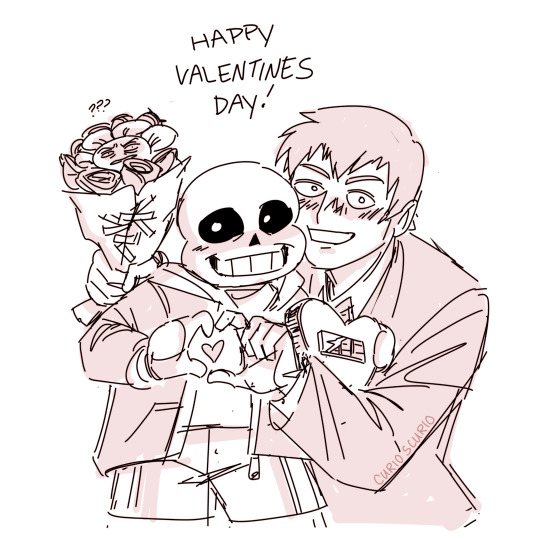
Happy Valentines Day
context:
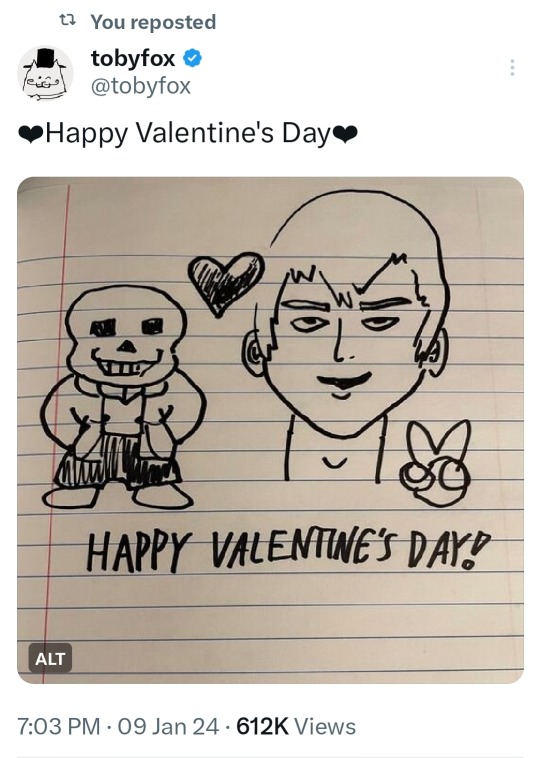
25K notes
·
View notes
Text
No I’m not attracted to you. Quit your evil putting your finger under my chin to make me look up at you. I know I’m your nemesis and all but we really need to set some boundaries when you’ve got me tied up like this.
95K notes
·
View notes
Text
Death Note AU where hbomberguy makes a five hour long video about youtuber Light Yagami that's initially completely unrelated to the murders (Light would probably plagiarize or have really unhinged right-wing political takes if he was on youtube)
but halfway through he reveals that while researching he stumbled upon evidence that Light might be behind the Kira murders, and then spends like fourty minutes explaining the concept of a shinigami, an hour explaining how he thinks Light used one to commit murders, and then another hour explaining Light's ideology and why the concept of criminals being inherently evil is flawed
He finishes the video by addressing Light directly and telling him that he (Hbomberguy) had his name legally changed before uploading the video, to something that only he knows, making it impossible for Light to kill him
137K notes
·
View notes
Text

watching sopranos with calculator. god i'm nervous. she's so pretty
8K notes
·
View notes
Text
adam wakes up, probes his side. rib gone, wound sticky. god's fingers have touched a place that will never be touched again. how does adam not curl up, swell and fall, beg god to touch him again. to touch him everywhere else. not just ribs but cheek, inner thigh, lap. the worst part of the side-wound is not that god penetrated you but that he won't do it again
13K notes
·
View notes
Text
A Somewhat Messy Exploration of the Concepts of Purity and Impurity in Satosugu, and perhaps some more

The yin and yang symbolism in Satosugu (here I'm using 'Satosugu' as a short way to refer to the relationship between these characters, not necessarily a ship dynamic) has been brought up and discussed a lot in fan analyses lately, and by those who have mental capacity to express it far better than I ever could. However, there is one more thing I would like to talk about in relation to Suguru Geto and Satoru Gojo's dichotomy, and perhaps some more.
As much influence as Chinese philosophical concepts (such as already mentioned yin-yang) have on Japanese cosmology, religious views of the people of Japan are actually an intricate and complex amalgamation of various teachings and beliefs, with Shinto being numerically the most prominent faith of the country. I was curious as to how the ideas found in Shinto could be applied to Gojo and Geto's relationship, and I guess I've stumbled upon some inkling of a thought in this regard -- so please bear with me while I rant.
Before this gets too long, I'm putting my rambling below the cut.
To begin with and give a little bit of context, the core teaching of Shinto is to have profound respect and reverence for nature. As a polytheistic and animistic religion, Shinto is defined by its belief in the kami, who are stated to inhabit all things, including objects of the surrounding landscape and various natural forces. Due to such elemental qualities of the faith, purification takes place as one of its central aspects and a widely followed practice, as well. There is a great emphasis laid on spiritual and physical purity and cleanliness. That being so, the moral categories of good and evil (or virtue and sin), so important in the western worldview, give way to a different outlook on things: the world is perceived in terms of 'clean' and 'dirty' rather than 'good' and 'bad'.
This concept finds a reflection in Gege's writing primarily through Tsumiki as someone who's essentially an embodiment of the virtue of being innocent and pure at heart. When she's brought up in the narrative, the image is frequently accompanied by flowers -- and more often than not, especially when it comes to Megumi's perspective, those flowers are white lilies. And those are one of the most common and prominent symbols of purity. When Tsumiki's innocence is symbolically destroyed with Yorozu taking over her body, white blossoms are depicted as thrashed and stained in the background. Her purity is further defiled by her death as everything related to death and decay is considered foul as it desecrates the world's natural state of cleanliness, fertility and life.
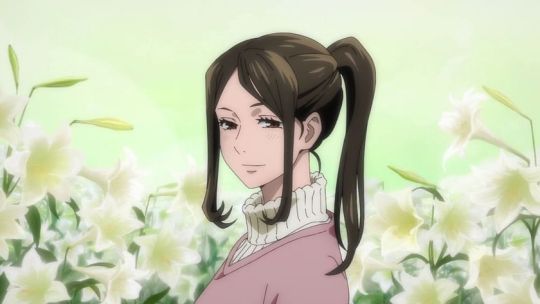
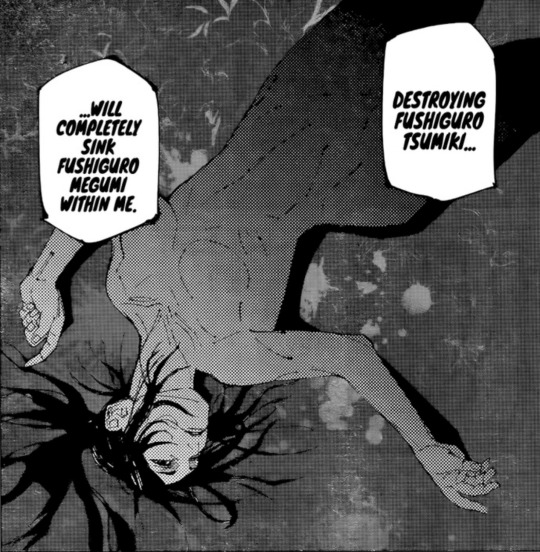
I'm only bringing this up to show how Gege incorporates this religious framework into the body of symbolism in his story. And the further you search with these concepts in mind, the more you are able to uncover.
Satoru Gojo as purity and perfection
Satoru Gojo is a character whom you can't help but read as a perfection within the context of the world he exists in. He's the absolute strongest, wielding the power to bring all the knowledge of the universe and the forces which shape it under his control, he's repeatedly elevated by the narrative as someone unreachable and untouchable whereas nothing seems to be beyond his reach. He also has an extraordinary appearance, matching vibrant aquamarine eyes with fair hair, so rarely found among full-blooded Japanese people. He embodies an ideal for his society.
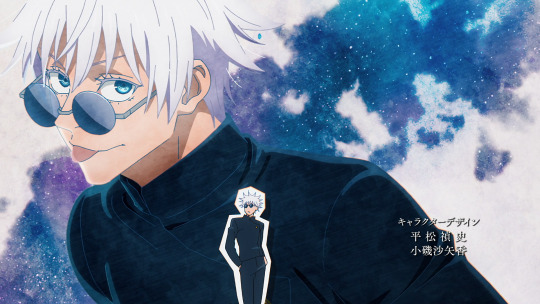
Satoru is associated with white and sky blue -- the colours most widely believed to represent purity, innocence, perfection, serenity and safety. Those are lofty, noble, airy and spacious hues which also bring in mind vast open spaces and immeasurable and unreachable heights and depths, symbolizing Gojo's detachment from the mundane world where corruption and putrefaction take deep root. Not to mention Satoru's noble background as an heir of one of the Big Three Sorcerer Families.
Actually no, forget this, I do want to mention it and expand a little on my thoughts regarding Satoru's family and upbringing. It's highly likely he was overprotected and sheltered as a child, and along with a teenage-years rebellion on his part which such a childhhod brought about, it also thwarted his ability to make connections with people around him as he basically lacks common experiences and/or interests with them. He's somewhat sterile when it comes to displaying empathy and emotional intelligence, which results in a peculiar sense of innocence about him. For the lack of any better way to articulate this idea, I'd say he's pure in this regard: clean and untouchable and spotless, devoid of nearly everything that comprises a regular person's experience.
This shows even in the way Gojo chooses to cope with his trauma in the aftermath of the Star Plasma Vessel Incident. That traumatic experience seemingly barely leaves a mark on him because he opts for pushing it aside and moving forward, while going out of his way to make sure there's a safe distance between him and the source of his vulnerability by improving his technique. He fixates on bringing his Infinity technique to perfection, and as a result it leaves no opportunity for anything to touch him if he himself does not want it to. Yet again, it leaves him stainless.
Not only that: he becomes emotionally detached from the cruelty and filth of the jujutsu world, becomes numb to it, with little to no emotion ever reaching his core to shake it. He's neither angry nor vengeful on Amanai's behalf after her death. He does not allow for hatred and spite to poison his mind, neither does he feel any doubt. He stays clean from all the negativity at the cost of coming off as cynical and unsympathetic.
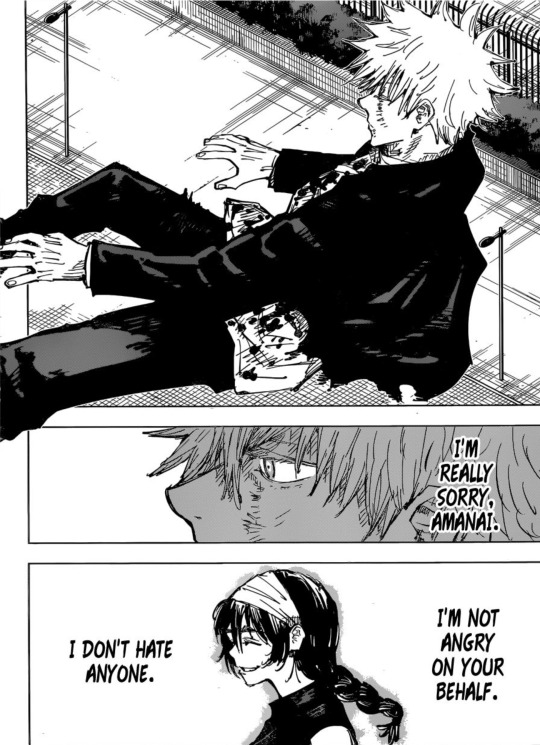
He masks this by putting up a front of an emotionally immature individual with childlike mannerisms and an attitude resembling that of a teenager rather than a fully grown man. He also nurtures a somewhat naive belief that Suguru still can be trusted, that there's some hope for him turning away from the path he's chosen. In this regard, he still bears the innocence of a child.
Last but not least, shedding away the more humanly parts of himself, Gojo instead becomes more attuned to the natural world through his ascension -- the main source of purity, as Shinto has it. Moreover, he basically rejects death by coming back from the dead after finally grasping how Reversed Cursed Energy works. And I've already explained the importance of something like this when talking about Tsumiki's passing.
Gojo Satoru's mind is free from resentment and hate, his body unstained by death. He's a character who represents complete spiritual and physical purity.
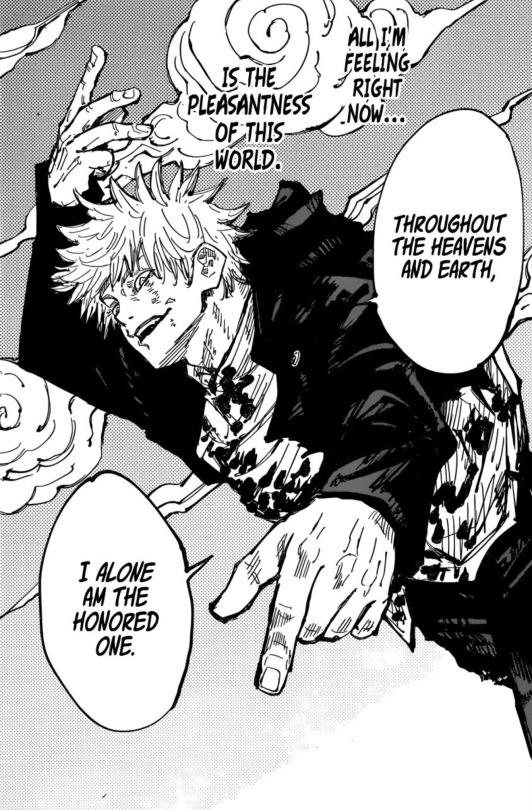
Suguru Geto as impurity and corruption
Where Gojo's character exhibits perfection, Geto shows abruptly stunted growth and degradation gnawing away at him bit by bit; where Gojo stands to symbolize cleanliness and purity, Geto presents desolation and decay and that filth which is left in their wake. Geto is a character whom the narrative treats as a symbolic foil to Gojo, starting from him being expelled from Jujutsu High and ending with his death being described in the light novel as a curse purged from existence. If Gojo serves as an example of a perfectly fit cog in jujutsu society and sets up a desirable ideal, Geto, named the worst of all known curse users, represents everything that the very same society fears and despises.
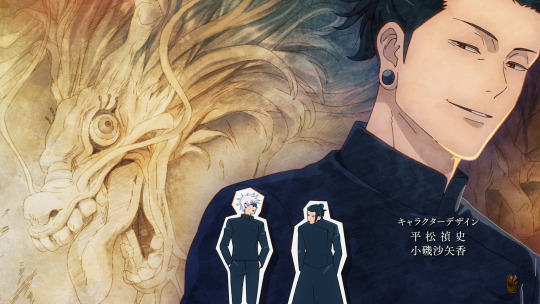
Starting with colour symbolism again, such colours as black, dark brown, warm beige and mustard yellow are the most common colours to be associated with dirt and a filthy, dingy appearance. And while I'm not saying Suguru himself has such an appearance (although he does forsake taking care of himself at some point), those all are the colours found in his palette. Black is also considered to be the hardest colour to keep clean, even more so than white, as it shows all the stains and grime so well. Which is quite interesting if you consider that Suguru's downfall and defection ultimately bring out, both to the audience and to Satoru, everything not only malfunctioning, but straightforward cruel, vile and despicable in the existing system.
Geto's deeply empathetic personality is the basis for his own corruption, his inability to set boundaries between his own emotions and the suffering of others leaves him extremely vulnerable in a society which actively punishes people for being unable to extract emotion from their duty and caring too much. The thing is, Suguru is elbow-deep in emotion. For instance, if Satoru managed to shove his feelings aside in order to put together a plan of action when Kuroi got abducted, Suguru immeadiately plunged into self-blame. His own empathy is what's clouding his vision, his feelings pile up within him without any healthy outlet until they start rotting him from the inside.
Geto lets the rot in by caring too deeply, vile emotions that he feels on behalf of others festering in his mind. He can't stand the sight of atrocities commited by Jujutsu society and finds them nauseating, while the rest of the world he exists in treats those abominations as a norm. And even so, he dives deeper into all this by trying to make a difference and save ordinary people.
This is symbolically represented by Geto's Curse Manipulation, with him consuming curses which are basically a corporeal manifestation of all the negative emotions people vent into the world in their daily lives. The more curses he absorbs, the more doubt and resentment he lets inside and the more they consequently stain his once pure ideals and aspirations with bile building up inside of him. His very sense of self is twisted by the weight of the unsightly hideous reality, and while he stays true to his strict set of ideals he is forced to adapt by the trauma of his experience as a sorcerer and the 'realisation' which it brings. Because if one endures such severely traumatic events, one must sooner or later come to the conclusion that there's something inherently wrong and malfunctioning -- either with you or the world you live in. Geto chooses to stay true to himself by assuming it's the latter, and this choice results in his corruption in the eyes of those who run that very world.
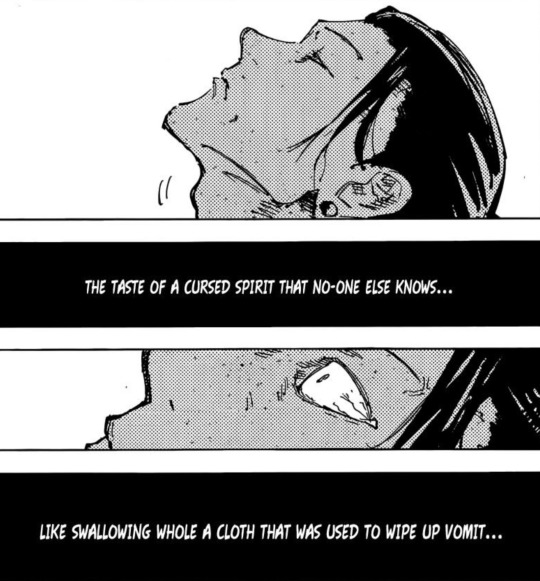
There's also something to be said about the intimacy of the act of consumpton: you let the thing you consume nurture you and become a part of you. Cursed spirits taste absolutely foul, and what that means to put this despicable thing in your mouth and swallow it is unimaginable. Geto's absorbtion of curses is supposed to represent how he basically desacrates himself by letting himself experience everything at such a deep emotional level, inevitably tying himself to putrefaction of the world.
And of course, the last thing that plays its role in the defilement of Geto's character is his death.
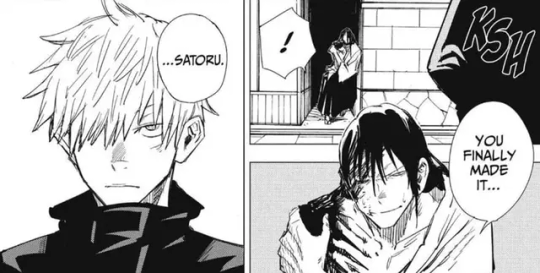
Brief wrap-up thoughts
I could honestly ramble on and on about this for ages, but I guess it all just boils down to my admiration for Gege's ability to break the mold with his writing. He takes a trait which is largely associated with protagonists of their stories and shapes his villain's whole personality around it -- and vice versa, with Gojo and his seemingly egotistic tendencies.
Once again, Japanese religious beliefs organically encompass so many elements originating from so many cultures with no coherent systematization existing up untill late 19th centuary, and I find it absolutely fascinating how Gege's story reflects that. It leaves us with such an interesting controversy of an emotionally detached hero dwelling in a morally grey area alongside with a deeply empathetic antagonist whom both other characters and the audience find deserving of sympathy and pity.
173 notes
·
View notes
